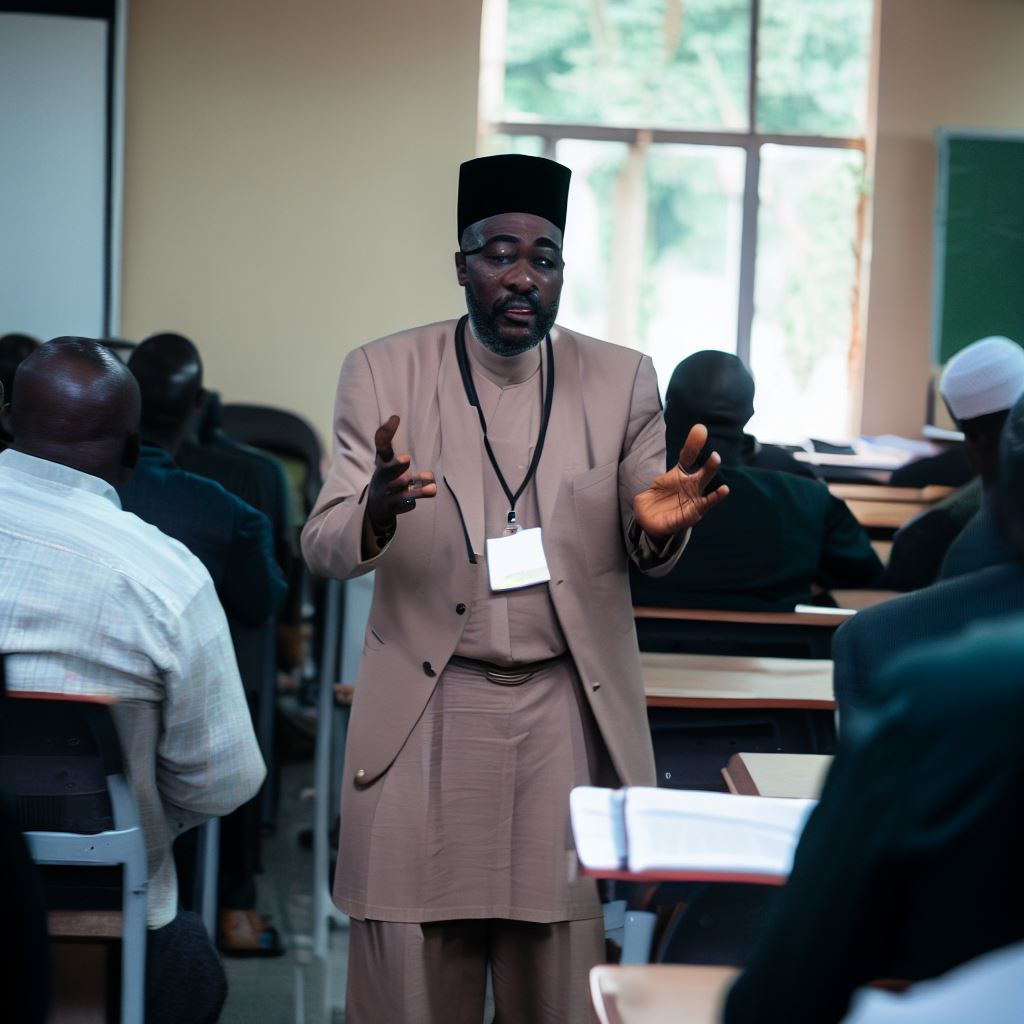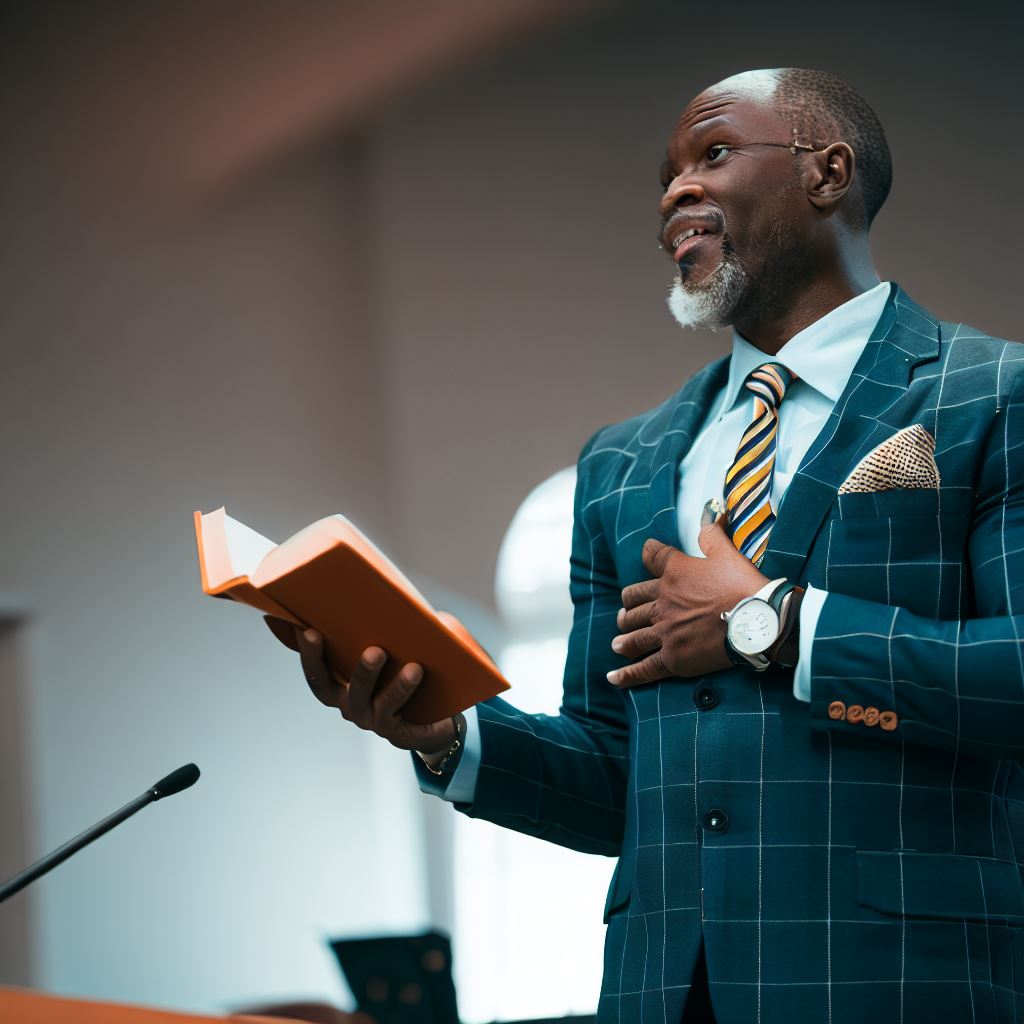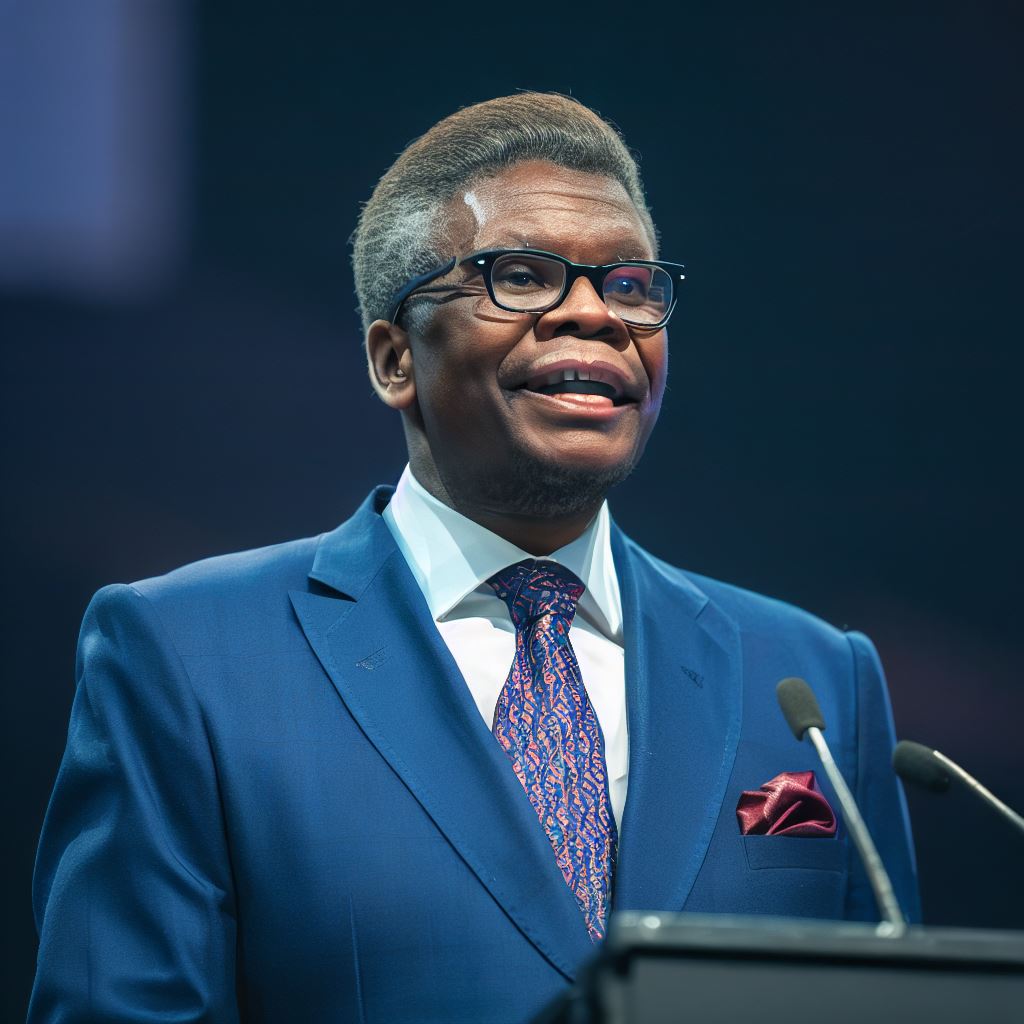Introduction
Theological education plays a crucial role in shaping pastors in Nigeria for effective ministry.
It equips them with the necessary knowledge, skills, and spiritual foundation to lead their congregations and address the challenges they face.
Statistics reveal that Nigeria has one of the largest Christian populations in Africa, with over 86 million Christians.
This highlights the significance of theological education in ensuring that pastors are adequately prepared to serve this growing number of believers.
Furthermore, the context in which pastors minister in Nigeria is complex and diverse. They are confronted with issues like poverty, corruption, religious conflicts, and societal challenges.
Theological education equips pastors to engage with these challenges through a biblically grounded, culturally relevant, and socially transformative approach.
Pastors need a strong theological foundation to effectively interpret Scriptures, teach sound doctrine, and guide believers in their faith journeys.
Theological education provides pastors with a comprehensive understanding of the Bible, theology, ethics, church history, and pastoral care.
Additionally, effective leadership skills are essential for pastors to navigate the complexities of congregational management, community engagement, and interfaith dialogue.
Theological education equips pastors with leadership principles, organizational skills, conflict resolution strategies, and effective communication techniques.
In essence, the significance of theological education for pastors in Nigeria cannot be overemphasized.
It empowers pastors to faithfully fulfill their calling, lead their congregations, and impact their communities.
Through theological education, pastors are equipped to effectively minister in the diverse and challenging Nigerian context.
Historical Background of Theological Education in Nigeria
A. The beginnings and development of theological education in Nigeria
Theological education in Nigeria has a rich history that can be traced back to the arrival of Christian missionaries in the 19th century.
The early missionaries played a key role in establishing the foundations of theological education in the country.
The first theological institutions were established by missionary societies such as the Church Missionary Society, the Wesleyan Methodist Missionary Society, and the Roman Catholic Church.
These institutions aimed to train indigenous pastors and leaders to spread Christianity and establish churches in Nigeria.
One of the earliest theological institutions in Nigeria was the Fourah Bay College, established in Freetown, Sierra Leone in 1827.
Many Nigerian students attended Fourah Bay College to receive theological training.
In 1901, the Church Missionary Society (CMS) established the first theological institution in Nigeria, known as the CMS Training Institution, in Abeokuta.
This institution provided training for both Nigerian and Sierra Leonean students.
The establishment of the CMS Training Institution marked a turning point in the development of theological education in Nigeria.
As Nigeria gained independence in 1960, there was an increasing desire for indigenous theological institutions.
B. Emergence of different theological institutions and their roles
The first indigenous theological institution in Nigeria, the Nigerian Baptist Theological Seminary, was established in 1898.
Over the years, other indigenous theological institutions emerged, including the ECWA Theological Seminary and the Catholic Institute of West Africa.
These institutions played a vital role in training pastors and leaders to meet the growing demand for theological education in Nigeria.
In addition to these institutions, numerous Bible colleges and seminaries were established by various denominations across the country.
These institutions focused on equipping students with biblical knowledge, theological understanding, and practical ministry skills.
Today, there is a diverse range of theological institutions in Nigeria, catering to different denominational backgrounds and theological perspectives.
These institutions serve as important hubs for theological learning, research, and the formation of pastors and Christian leaders.
With the rapid expansion of Christianity in Nigeria, the demand for quality theological education continues to increase.
Theological institutions are constantly adapting to address the evolving needs and challenges faced by pastors and Christian leaders in Nigeria.
The history of theological education in Nigeria is a testament to the commitment of churches and institutions in equipping pastors for effective ministry in the diverse Nigerian context.
Read: Roles and Responsibilities of Pastors in Nigeria Today
Current Challenges in Theological Education for Pastors in Nigeria
These current challenges in theological education for pastors in Nigeria contribute to a less-prepared pastoral workforce.
It is crucial to address these obstacles to ensure the development of competent and well-equipped pastors who can effectively serve their communities.
1. Accessibility
Limited availability of theological education institutions in Nigeria significantly hinders aspiring pastors from accessing quality education.
The concentration of these institutions in major cities leaves rural areas underserved.
2. Affordability
The high cost of theological education in Nigeria is a major barrier for aspiring pastors.
Tuition fees, accommodation, and other expenses associated with pursuing theological studies are often beyond the financial capabilities of many individuals.
3. Quality of Education
Some theological education institutions in Nigeria lack proper accreditation and fail to adhere to recognized standards.
This raises concerns about the quality of education provided and the competence of pastors trained in such institutions.
4. Inadequate Resources
Many theological schools in Nigeria struggle to provide adequate resources, including libraries, computer labs, and modern educational facilities.
This limits the access to up-to-date information and technological advancements.
5. Religious Pluralism
Nigeria’s religious diversity, with Christianity, Islam, and indigenous religions, requires pastors to be equipped with interfaith understanding and engagement skills.
Theological education should address this aspect to enable pastors to effectively minister to people of different faiths.
6. Lack of Practical Training
Theoretical knowledge alone is insufficient for effective pastoral ministry.
However, many theological education programs in Nigeria focus more on theoretical teachings and neglect practical training, leaving pastors ill-prepared for real-world ministry challenges.
7. Language Barrier
English is the official language of Nigeria, but some aspiring pastors may have limited proficiency, hindering their ability to fully engage with theological education materials that are primarily in English.
8. Socio-economic Constraints
Poverty and lack of financial support limit many individuals’ access to theological education.
Scholarships, grants, and affordable funding options are crucial to offsetting the financial burden of pastoral education.
9. Gender Inequality
Cultural and religious biases restrict female aspiring pastors’ opportunities for theological education.
Addressing gender inequality in access to and support for pastoral education is essential for a more inclusive and diverse pastoral workforce.
10. Political Instability
The political context in Nigeria can impose disruptions and uncertainties on theological education.
Political instability may lead to closures or limited resources for theological institutions, affecting the education of aspiring pastors.
In essence, theological education in Nigeria faces various challenges, including limited accessibility, high costs, and concerns about quality.
Adequate resources, practical training, and addressing socio-economic and gender inequalities are essential to overcome these obstacles.
By addressing these challenges, Nigeria can develop a well-prepared pastoral workforce capable of effectively serving diverse communities and advancing the Christian faith.
Read: Becoming a Pastor in Nigeria: An In-Depth Career Guide
The Theological Education Pathway for Pastors in Nigeria
In Nigeria, the pathway to theological education for pastors involves several stages or steps, each with its own requirements and qualifications.
These stages are vital in preparing pastors for their ministry and ensuring they have the necessary knowledge and skills to serve their congregations effectively.
1. Basic Education Stage
- Obtain a high school diploma or its equivalent.
- Have a strong foundation in English, mathematics, and other relevant subjects.
- Develop good communication and critical thinking skills.
2. Undergraduate Stage
- Enroll in a recognized theological institution or a university with a theological program.
- Pursue a bachelor’s degree in theology, divinity, or a related field.
- Complete coursework in biblical studies, church history, theology, and pastoral care.
- Obtain a minimum GPA requirement set by the institution.
- Active participation in practical ministry, such as internships and practical fieldwork.
3. Postgraduate Stage
- Pursue a master’s degree in theology, ministry, or a specialized field of study.
- Complete advanced coursework in areas like biblical exegesis, systematic theology, or pastoral counseling.
- Conduct research and write a thesis or dissertation.
- Obtain a minimum GPA requirement set by the institution.
- Engage in internships or practicums to gain practical experience in ministry.
4. Ordination Stage
- Seek endorsement from a recognized religious body or denomination.
- Complete a period of supervised practical ministry or internship.
- Participate in theological examinations to demonstrate knowledge and competency.
- Adhere to the ethical and moral standards set by the religious body or denomination.
- Receive official ordination as a pastor or clergy member.
5. Continuing Education Stage
- Engage in ongoing professional development through conferences, workshops, and seminars.
- Stay updated with theological trends, biblical scholarship, and pastoral practices.
- Pursue advanced degrees, such as a Doctor of Ministry, to deepen theological knowledge.
- Participate in mentorship programs or spiritual guidance to enhance ministry skills.
- Continually seek self-improvement and personal growth as a pastor.
It is essential to note that the requirements and qualifications may vary depending on the theological institution or denomination.
Additionally, some pastors may choose alternative pathways, such as distance learning programs or specialized training courses, to supplement their theological education.
By following this pathway, pastors in Nigeria are equipped with a solid foundation in theology, biblical studies, and practical ministry.
They are prepared to lead their congregations, preach the gospel, provide pastoral care, and navigate the challenges of modern society.
The theological education pathway empowers pastors to effectively serve their communities, promote spiritual growth, and bring hope and transformation to the lives of believers.
Read: Interfaith Dialogue: Role of Imams in Nigeria Today
The Role of Theological Institutions in Nigeria
Theological institutions play a crucial role in shaping the education of pastors in Nigeria.
These institutions contribute significantly to the development of pastors by providing them with the necessary knowledge, skills, and resources to effectively carry out their ministry.
A. Contribution of Theological Institutions
- Theological institutions offer specialized theological education tailored to the needs of pastors in Nigeria.
- They provide a platform for pastors to gain a deep understanding of biblical principles and Christian doctrine.
- These institutions promote spiritual growth and nurture the personal faith of future pastors.
- Theological institutions help pastors develop critical thinking skills and engage in theological reflection.
- They offer pastoral counseling and pastoral care courses, equipping pastors to effectively minister to their congregations.
- These institutions facilitate networking and collaboration among pastors, fostering a sense of community and support.
- Theological institutions promote the development of leadership qualities among pastors.
- They encourage pastors to be culturally sensitive and to engage with the local context of their ministry.
- These institutions provide opportunities for pastors to learn from experienced theologians and pastors.
- They offer theological research facilities that allow pastors to delve deeper into specific areas of study.
B. Curriculum, Teaching Methods, and Resources
The curriculum, teaching methods, and resources utilized by theological institutions in Nigeria are designed to provide pastors with a well-rounded education.
- Curriculum: The curriculum of theological institutions encompasses various subjects, including biblical studies, theology, pastoral care, counseling, ethics, church history, and practical ministry. It is designed to equip pastors with a comprehensive understanding of their calling.
- Teaching Methods: These institutions employ a range of teaching methods, including lectures, seminars, group discussions, case studies, fieldwork, and practical ministry experiences. This diverse approach ensures pastors receive both theoretical knowledge and practical skills.
- Resources: Theological institutions in Nigeria make use of various resources to enhance the learning experience. These include libraries with extensive collections of theological books, journals, and online databases. They also provide access to audiovisual aids, computer laboratories, and internet facilities.
- Faculty: The faculty members of these institutions are highly qualified theologians and experienced pastors who bring their expertise and practical knowledge into the classroom. They serve as mentors and role models for aspiring pastors.
- Internships: Many theological institutions in Nigeria have partnerships with churches, allowing students to engage in internships and gain firsthand experience in ministry. This practical exposure enriches their learning and prepares them for real-world challenges.
In reveiw, theological institutions in Nigeria play a vital role in shaping the education of pastors.
Through their specialized education, these institutions contribute to the spiritual, intellectual, and practical growth of pastors, preparing them to effectively serve their congregations and communities.
Read: Youth Education: How Imams Shape Minds in Nigeria

Benefits of Theological Education for Pastors in Nigeria
A. Advantages of pursuing theological education
- Deepens understanding of theological concepts and principles.
- Develops critical thinking and analytical skills.
- Provides a solid biblical foundation for effective ministry.
- Equips pastors with the necessary tools to address complex theological issues.
- Enhances the ability to interpret and apply scripture accurately.
- Promotes the growth of personal faith and spiritual maturity.
- Enables pastors to engage in theological dialogue and contribute to theological scholarship.
B. Positive outcomes of pursuing theological education
- Increases confidence in handling various pastoral responsibilities.
- Enhances pastoral counseling skills, leading to greater effectiveness in addressing congregational needs.
- Builds strong leadership abilities to guide and inspire church members.
- Encourages the development of a servant-hearted attitude in pastoral ministry.
- Equips pastors to navigate cross-cultural challenges and effectively engage with diverse congregations.
- Fosters a deeper understanding of the historical and cultural context of Christianity in Nigeria.
- Provides pastors with the skills to effectively communicate and engage in public speaking.
- Increases credibility and respect within the congregation and wider community.
- Promotes unity and cooperation among pastors from different denominations through shared theological training.
- Prepares pastors to effectively defend and articulate their beliefs in an increasingly secular society.
C. Enhancement of pastoral skills through theological education
Pursuing theological education equips pastors with a range of practical skills that enhance their pastoral ministry:
- Effective sermon preparation and delivery techniques.
- Skillful handling of biblical interpretation to address specific congregational needs.
- Pastoral counseling strategies to provide guidance and support to individuals and families.
- Conflict resolution and peacemaking techniques within the church community.
- Development of discipleship programs tailored to the spiritual growth of church members.
- Implementation of effective evangelism and outreach strategies to reach the lost.
D. Strengthening of leadership abilities through theological education
Theological education equips pastors with the necessary leadership skills to guide and inspire their congregations:
- Training in strategic planning and effective organizational management.
- Development of visionary leadership to guide the church towards a preferred future.
- Building a collaborative and inclusive leadership style that encourages the participation of church members.
- Nurturing effective communication skills to connect and engage with diverse congregations.
- Understanding and practicing ethical leadership in line with biblical principles.
- Empowering and equipping church members for their respective roles and ministries.
E. Expansion of theological knowledge through education
Theological education provides pastors with a broader understanding of the Christian faith:
- Exploration of biblical theology, systematic theology, and church history.
- Engagement with contemporary theological issues and debates.
- Study of different theological perspectives and traditions.
- Strengthening of biblical literacy and knowledge of scripture.
- Increased familiarity with theological resources and tools for ongoing learning.
- Development of a well-rounded theological worldview that informs preaching and teaching.
In a nutshell, pursuing theological education offers numerous advantages and positive outcomes for pastors in Nigeria.
It enhances pastoral skills, leadership abilities, and theological knowledge, enabling pastors to effectively fulfill their calling and serve their congregations in a globally connected and ever-evolving world.
Financial Assistance and Scholarships for Theological Education in Nigeria
Aspiring pastors in Nigeria are not left without financial resources and support on their theological education journey.
There are various avenues through which they can receive assistance, including scholarships, grants, and sponsorships.
These opportunities not only alleviate the financial burden but also encourage and motivate individuals to pursue their calling. Here are some of the available financial resources for aspiring pastors in Nigeria:
1. Scholarships
Several organizations and institutions offer scholarships specifically designed for theological studies in Nigeria.
These scholarships are merit-based and can cover a significant portion or even the entire cost of tuition fees.
2. Grants
Various foundations and religious organizations provide grants to theological students to assist with their educational expenses.
These grants can be used to cover tuition, books, housing, and other related costs.
3. Sponsorships
Many churches in Nigeria sponsor individuals who are pursuing theological education.
These sponsorships can include financial support for tuition fees, living expenses, and even mentorship programs.
Publish Your Professional Profile, Business or Brand
Showcase your expertise, gain trust, and boost visibility instantly on Professions.ng.
Publish Now4. Denominational Support
Denominations often have funds set aside to support aspiring pastors in their educational endeavors.
These funds can be accessed by individuals affiliated with the denomination and are usually awarded based on need and merit.
5. Internship Programs
Some theological institutions offer internship programs that provide students with a stipend or financial assistance while gaining practical experience in ministry.
These programs not only help students financially but also provide valuable hands-on training.
6. Government Scholarships
The Nigerian government also offers scholarships for students pursuing higher education, including theological studies.
These scholarships are highly competitive and often cover tuition fees, accommodation, and a monthly stipend.
7. Foreign Scholarships
There are international organizations and foreign institutions that provide scholarships for Nigerian students to study theology abroad.
These scholarships open up opportunities for exposure to different cultures and theological perspectives.
8. Work-Study Programs
Some theological institutions offer work-study programs where students can work part-time on campus to earn money and offset their educational expenses.
It is essential for aspiring pastors to explore these financial resources and apply for the opportunities available to them.
By actively seeking financial assistance and scholarships, individuals can focus on their studies and ministry without the burden of financial strain.
However, it is crucial to note that each opportunity may have specific requirements and deadlines, so thorough research and early application are necessary.
Additionally, aspiring pastors can also consider alternative methods of funding their theological education, such as crowdfunding through online platforms or seeking support from their local church communities.
Many churches are willing to invest in the education of their future pastors and may provide financial assistance or create special funds to assist individuals on their journey.
Basically, financial assistance and scholarships play a vital role in supporting aspiring pastors in Nigeria on their theological education pathway.
With the availability of scholarships, grants, sponsorships, and other resources, individuals can pursue their calling without the burden of financial constraints.
By actively exploring these opportunities and seeking support from various organizations, institutions, and churches, aspiring pastors can embark on their educational journey with confidence and dedication to their ministry.
Recommendations for Improving Theological Education in Nigeria
The theological education pathway for pastors in Nigeria faces various challenges that hinder its effectiveness and quality.
To overcome these challenges and improve theological education, several recommendations can be implemented:
1. Enhance Curriculum
- Update and revise the curriculum to address current theological issues and challenges.
- Incorporate practical ministry skills, leadership development, and pastoral counseling.
2. Faculty Development
- Provide ongoing training and development opportunities for theological educators.
- Encourage faculty to engage in research and publication to enhance scholarship and knowledge.
3. Engage Qualified Instructors
- Recruit and hire instructors with strong academic backgrounds and practical ministry experience.
- Ensure instructors possess effective teaching methods and the ability to engage students.
4. Strengthen Library Resources
- Invest in building comprehensive theological libraries with diverse resources.
- Digitize libraries to provide wider access to theological literature and academic resources.
5. Create Partnerships
- Establish partnerships with reputable international theological institutions for exchange programs and collaborations.
- Foster collaboration among Nigerian theological institutions to share resources and expertise.
6. Emphasize Continuous Education
- Promote lifelong learning among pastors by offering continuing education programs and workshops.
- Encourage pastors to pursue advanced degrees to enhance their knowledge and skills.
7. Improve Infrastructure
- Invest in modern facilities and technology to create conducive learning environments.
- Upgrade classrooms, libraries, and study areas for optimal learning experiences.
8. Enhance Financial Support
- Provide scholarships, grants, and loans to make theological education more affordable.
- Seek financial partnerships with churches, organizations, and government entities.
9. Promote Research Culture
- Encourage students and faculty to engage in theological research and produce scholarly work.
- Organize conferences and seminars to promote the sharing of research findings.
10. Quality Assurance Mechanisms
- Establish accreditation bodies to ensure the quality and standards of theological education.
- Regularly evaluate theological institutions and programs to maintain high educational standards.
All in all, improving theological education in Nigeria requires a concerted effort from various stakeholders.
By implementing these recommendations, the accessibility, affordability, and quality of theological education can be significantly enhanced.
With a well-equipped and competent pastoral workforce, the Nigerian church will be better equipped to address the spiritual needs of its congregations and contribute positively to society.
Conclusion
This blog post has highlighted the importance of theological education in developing effective pastors in Nigeria.
The main points discussed include the significance of foundational biblical knowledge, the importance of practical ministry training, and the need for ongoing theological education.
By equipping pastors with a strong foundation in biblical knowledge, they are better prepared to lead their congregations and address theological questions.
Additionally, practical ministry training allows pastors to develop essential skills such as preaching, counseling, and leadership.
Furthermore, on-going theological education is crucial for pastors to stay updated with current trends and theological debates.
It enables them to navigate challenges in a rapidly changing society and address emerging issues within their communities.
Theological education also helps pastors cultivate a deep love for God and a passion for the Gospel.
It strengthens their faith and enables them to effectively communicate and inspire others to grow in their relationship with God.
The requirement for well-trained and educated pastors in Nigeria cannot be overstated. Theological education equips pastors to serve their congregations with integrity, sound doctrine, and practical wisdom.
It ensures that pastors are equipped to address the needs of their communities, provide effective leadership, and promote transformative change.
Therefore, investing in theological education is essential for the future of the church in Nigeria.
It ensures that pastors are equipped to provide spiritual guidance, foster discipleship, and play a vital role in the growth and development of the Christian faith in Nigeria.




